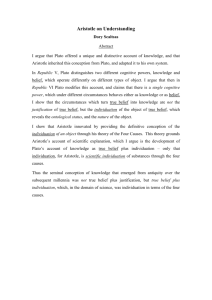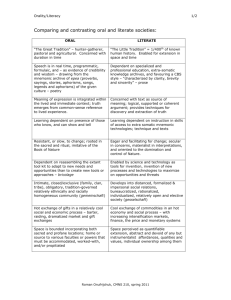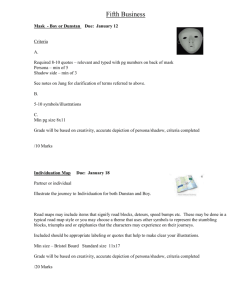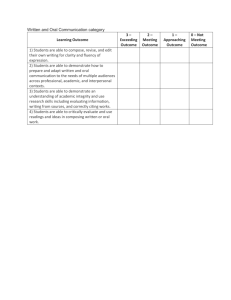Composing Criteria of Individuation Matthew Gotham London Semantics Day
advertisement
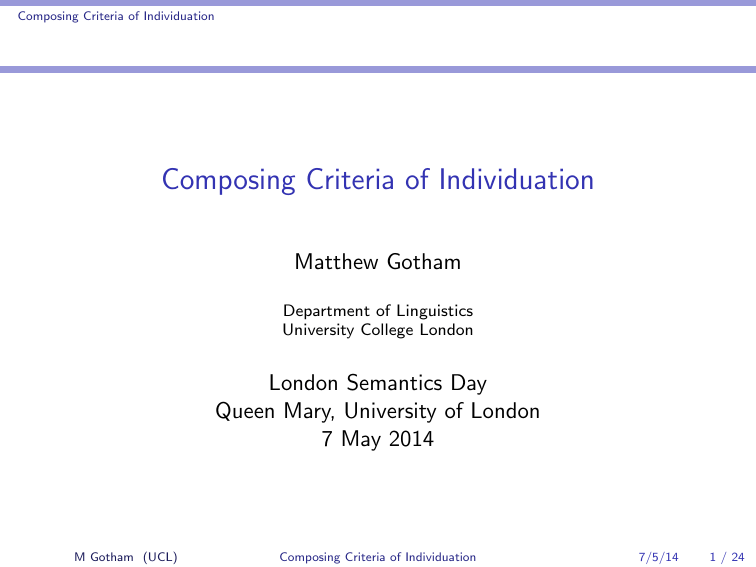
Composing Criteria of Individuation
Composing Criteria of Individuation
Matthew Gotham
Department of Linguistics
University College London
London Semantics Day
Queen Mary, University of London
7 May 2014
M Gotham (UCL)
Composing Criteria of Individuation
7/5/14
1 / 24
Composing Criteria of Individuation
Plan for today
Copredication
The counting and individuation issue
Compositional Theory
Comparison with other accounts
M Gotham (UCL)
Composing Criteria of Individuation
7/5/14
2 / 24
Composing Criteria of Individuation
Copredication
Copredication
The apparent attribution of incompatible properties to a single object.
Some examples:
(1) Lunch was delicious but took forever. (Asher, 2011, p. 11)
(2) The bank was vandalised after calling in Bob’s debt.
(3) London is so unhappy, ugly and polluted that it should be destroyed
and rebuilt 100 miles away. (Chomsky, 2000, p. 37)
M Gotham (UCL)
Composing Criteria of Individuation
7/5/14
3 / 24
Composing Criteria of Individuation
Copredication
Issues
I
Philosophical
I
Compositional
I
Pragmatic and discourse-based
I
Counting and individuation
M Gotham (UCL)
Composing Criteria of Individuation
7/5/14
4 / 24
Composing Criteria of Individuation
The counting and individuation issue
A question of individuation
Suppose the library has two copies of Tolstoy’s War and Peace,
Peter takes out one, and John the other. Did Peter and John
take out the same book, or different books? If we attend to the
material factor of the lexical item, they took out different books;
if we focus on its abstract component, they took out the same
book. We can attend to both material and abstract factors
simultaneously. . .
(Chomsky, 2000, p. 16)
M Gotham (UCL)
Composing Criteria of Individuation
7/5/14
5 / 24
Composing Criteria of Individuation
The counting and individuation issue
Examples
(4) Fred picked up three books.
(5) Fred mastered three books.
(6) Fred picked up and mastered three books.
(7) Fred mastered three heavy books.
M Gotham (UCL)
Composing Criteria of Individuation
7/5/14
6 / 24
Composing Criteria of Individuation
The counting and individuation issue
volume 1
Notes from Underground
The Gambler
The Double
I
Physically: 1 book. Informationally: 3 books.
I
(5): True, (4),(6),(7): False
(4) Fred picked up three books. ×
(5) Fred mastered three books. X
(6) Fred picked up and mastered three books. ×
(7) Fred mastered three heavy books. ×
M Gotham (UCL)
Composing Criteria of Individuation
7/5/14
7 / 24
Composing Criteria of Individuation
The counting and individuation issue
volume 1
Notes from Underground
volume 2
Notes from Underground
volume 3
Notes from Underground
I
Physically: 3 books. Informationally: 1 books.
I
(4): True, (5),(6),(7): False
(4) Fred picked up three books. X
(5) Fred mastered three books. ×
(6) Fred picked up and mastered three books. ×
(7) Fred mastered three heavy books. ×
M Gotham (UCL)
Composing Criteria of Individuation
7/5/14
8 / 24
Composing Criteria of Individuation
The counting and individuation issue
The third criterion
Situation 1
v1
Situation 2
Notes from Underground
The Gambler
The Double
v1
Notes from Underground
v2
Notes from Underground
v3
Notes from Underground
(6) Fred picked up and mastered three books.
(7) Fred mastered three heavy books.
M Gotham (UCL)
Composing Criteria of Individuation
7/5/14
9 / 24
Composing Criteria of Individuation
Compositional Theory
Preliminaries
Key points
1. Nouns supporting copredication denote sets of complex objects—in
the case of ‘book’, objects that have a part that is a physical volume
and a part that is an informational (abstract) book.
2. Predicates encode criteria of individuation as part of their meaning.
3. Quantifiers access, compose and exploit criteria of individuation.
M Gotham (UCL)
Composing Criteria of Individuation
7/5/14
10 / 24
Composing Criteria of Individuation
Compositional Theory
Preliminaries
Complex objects
Suppose that we combine the books in situations 1 and 2 to make
situation 3:
v2 Notes from Underground
Notes from Underground
v3 Notes from Underground
v1
The Gambler
The Double
v4 Notes from Underground
[[book]]s3 ={v1 + NfU, v1 + TG, v1 + TD, v2 + NfU, v3 + NfU, v4 + NfU}
Problem: In this view, there are 6 books in situation 3.
Solution: This set of 6 is never used in plural quantification because
of restrictions imposed by determiners.
M Gotham (UCL)
Composing Criteria of Individuation
7/5/14
11 / 24
Composing Criteria of Individuation
Compositional Theory
Preliminaries
Distinctness criteria
I
Say that a group is ‘physically compressible’ iff there are two
members of it that are physically equivalent.
I
E.g. (8) is physically compressible, but (9) isn’t.
(8) v1 + NfU ⊕ v1 + TG ⊕ v2 + NfU
(9) v1 + TD ⊕ v2 + NfU ⊕ v3 + NfU
I
Both (8) and (9) are informationally compressible.
M Gotham (UCL)
Composing Criteria of Individuation
7/5/14
12 / 24
Composing Criteria of Individuation
Compositional Theory
Preliminaries
Composing distinctness criteria
I
We can express ‘x is physically compressible’ as (phys)comp(x).
I
Compressibilty statements can be complex, e.g.:
(phys t info)comp(x)—x is (physically or informationally)
compressible.
I
E.g. (phys t info)comp(a), but ¬(phys t info)comp(b)
(a) = v1 + TG ⊕ v2 + NfU ⊕ v3 + NfU
(b) = v1 + TG ⊕ v2 + NfU
M Gotham (UCL)
Composing Criteria of Individuation
7/5/14
13 / 24
Composing Criteria of Individuation
Compositional Theory
Preliminaries
Formally:
I
phys is shorthand for λxe .λye .phys-equiv0 (x, y )—the two-place
relation of physical equivalence.
I
(R)comp(x) is shorthand for
∃y ∃z(y 6= z ∧ y ≤a x ∧ z ≤a x ∧ R(y , z))—the statement that there
are two singletons (y and z) that are part of the group x and which
bear relation R to each other.
I
t is the generalized disjunction operator, familar from e.g. Partee and
Rooth (1983).
I
∴ (phys t info)comp(x) ≡
∃y ∃z(y 6= z ∧ y ≤a x ∧ z ≤a x ∧ (phys-equiv0 (y , z) ∨ info-equiv0 (y , z)))
M Gotham (UCL)
Composing Criteria of Individuation
7/5/14
14 / 24
Composing Criteria of Individuation
Compositional Theory
Lexical entries
Compositional theory
Novel lexical entries:
I [[book]] = λxe . book0 (x) , phys u info
I
[[books]] = λxe . *book0 (x) , phys u info
I
[[be heavy]] = λye . heavy0 (y ) , phys
I
[[be informative]] = λze . informative0 (z) , info
M Gotham (UCL)
Composing Criteria of Individuation
7/5/14
15 / 24
Composing Criteria of Individuation
Compositional Theory
Lexical entries
Quantification
[[three]] =λPe→ht×Ri .λQe→ht×Ri .
D
∃x |x| ≥ 3 ∧ π1 (Px) ∧ π1 (Qx) ∧ ¬(π2 (Px) t π2 (Qx))comp(x) ,
E
π2 (Px) u π2 (Qx)
∴[[three books]] =
λQe→ht×Ri .
D
∃x |x| ≥ 3 ∧ *book0 (x) ∧ π1 (Qx) ∧ ¬((phys u info) t π2 (Qx))comp(x) ,
E
(phys u info) u π2 (Qx)
M Gotham (UCL)
Composing Criteria of Individuation
7/5/14
16 / 24
Composing Criteria of Individuation
Compositional Theory
Lexical entries
Physical individuation
[[three books are heavy]] =
D
∃x |x| ≥ 3 ∧ *book0 (x) ∧ *heavy0 (x) ∧ ¬((phys u info) t phys)comp(x) ,
E
(phys u info) u phys
D
= ∃x |x| ≥ 3 ∧ *book0 (x) ∧ *heavy0 (x) ∧ ¬(phys)comp(x) ,
E
(10)
phys u info
M Gotham (UCL)
Composing Criteria of Individuation
7/5/14
17 / 24
Composing Criteria of Individuation
Compositional Theory
Composition
More pieces of the puzzle
[[λ1 [Fred mastered t1 ]]] = λxe . mastered0 (f 0 , x) , info
[[heavy]] = λPe→(t×R) .λye . (heavy0 (y ) ∧ π1 (Py )) , π2 (Py ) t phys
∴ [[heavy books]] = λye . *heavy0 (y ) ∧ *book0 (y ) , (phys u info) t phys
= λye . *heavy0 (y ) ∧ *book0 (y ) , phys
M Gotham (UCL)
Composing Criteria of Individuation
7/5/14
18 / 24
Composing Criteria of Individuation
Compositional Theory
Composition
Copredication
∴ [[three heavy books]] =
λQe→ht×Ri .
D
0
0
∃x |x| ≥ 3 ∧ *heavy (x) ∧ *book (x) ∧ π1 (Qx) ∧ ¬(phys t π2 (Qx))comp(x) ,
E
phys u π2 (Qx)
∴ [[Fred mastered three heavy books]] =
D
0
0
∃x |x| ≥ 3 ∧ *heavy (x) ∧ *book (x) ∧ mastered0 (f 0 , x) ∧ ¬(phys t info)comp(x) ,
E
phys u info
M Gotham (UCL)
Composing Criteria of Individuation
7/5/14
19 / 24
Composing Criteria of Individuation
Comparison with other accounts
Asher
Asher’s Type Composition Logic
Objects and aspects
Predication typically involves the attribution of a property to an
object considered under a certain conceptualization; this is what
an aspect is. [. . . ]
A lunch object is wholly an event (under one aspect) and wholly
food (under another aspect). When we speak or think of lunches
as food, there’s no “other part” of the lunch itself that’s left out
and that is an event. [. . . ]
I will codify the relation between aspects and the objects of
which they are aspects with the relation o-elab, which stands for
Object Elaboration. When I write o-elab(x, y ), I mean x is an
aspect of y , or x “elaborates” on the sort of object y is.
Asher, 2011, pp. 149–50
M Gotham (UCL)
Composing Criteria of Individuation
7/5/14
20 / 24
Composing Criteria of Individuation
Comparison with other accounts
Asher
Asher’s Type Composition Logic
Key features
Appeals to interactions between the process of predication and lexical
semantics.
I Nouns supporting copredication are assigned a lexical entry of ‘dot
type’, α • β. α and β are the types of the individual aspects under
which the object can be considered.
I Type conflicts involving dot types induce the introduction of material
into metalanguage formulae such that those type conflicts are
resolved.
Interpretation of (1):
I
λπ∃x(lunch(x, π) ∧ ((∃y (was delicious(y , π) ∧ o-elab(y , x, π)))
∧ ∃z(took forever(z, π) ∧ o-elab(z, x, π))))
x : food • event, y : food and z : event
M Gotham (UCL)
Composing Criteria of Individuation
7/5/14
21 / 24
Composing Criteria of Individuation
Comparison with other accounts
Asher
(4) Fred picked up three books.
λπ.∃v (v = Fred0 (π) ∧ ∃3 x(∃z(book0 (z, π) ∧ pick-up0 (v , x, π) ∧ o-elab(x, z, π))))
π : x : phys, z : phys • info
(7) Fred mastered three heavy books.
λπ.∃v (v = f 0 (π) ∧ ∃3 x(master0 (v , x, π)
∧ ∃z(book0 (z, π) ∧ o-elab(x, z, π)
∧ ∃y (heavy0 (y , π) ∧ o-elab(y , z, π)))))
π:
x : i, y : p, z : p • i
This says that there are three informational aspects of some book, i.e.
three books-individuated-informationally, such that Fred mastered them
and they have a physical aspect that is heavy. It is compatible with Fred
mastering the contents of a (heavy) trilogy. But (7) would not be true in
that situation.
M Gotham (UCL)
Composing Criteria of Individuation
7/5/14
22 / 24
Composing Criteria of Individuation
Comparison with other accounts
Cooper
Type Theory with Records
(Cooper, 2011)
p
: PhysObj
: InfObj
(11) [[book]] = λr : [x : Ind] i
cbook : book phys inf(r .x, p, i)
More than one way to convert (11) to a set for the purposes of
quantification, e.g.
I {a|∃r (r : [x : Ind] ∧ r .p = a) ∧ {b|b : [[book]](r )} =
6 ∅}
gets you the set of things a such that a is the physical aspects of
some book, i.e. the set of books individuated physically.
I {a|∃r (r : [x : Ind] ∧ r .i = a) ∧ {b|b : [[book]](r )} =
6 ∅}
gets you the set of things a such that a is the informational aspects of
some book, i.e. the set of books individuated informationally.
M Gotham (UCL)
Composing Criteria of Individuation
7/5/14
23 / 24
Composing Criteria of Individuation
Comparison with other accounts
Cooper
References
Asher, Nicholas (2011). Lexical Meaning in Context: A Web of Words.
Cambridge: Cambridge Univeristy Press.
Chomsky, Noam (2000). New Horizons in the Study of Language and
Mind. Cambridge: Cambridge University Press.
Cooper, Robin (2011). “Copredication, Quantification and Frames”. In:
Logical Aspects of Computational Linguistics. Ed. by Sylvain Pogodalla
and Jean-Philippe Prost. Lecture Notes in Computer Science 6736.
Berlin/Heidelberg: Springer, pp. 64–79.
Partee, Barbara Hall and Mats Rooth (1983). “Generalized Conjunction
and Type Ambiguity”. In: Meaning, Use and the Interpretation of
Language. Ed. by Rainer Bäuerle, Christoph Schwarze, and
Arnim von Stechow. Berlin: Walter de Gruyter, pp. 361–393.
M Gotham (UCL)
Composing Criteria of Individuation
7/5/14
24 / 24

